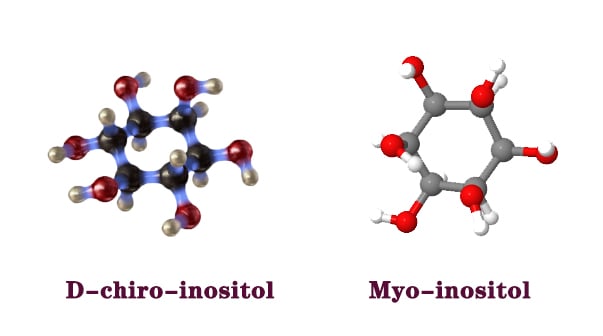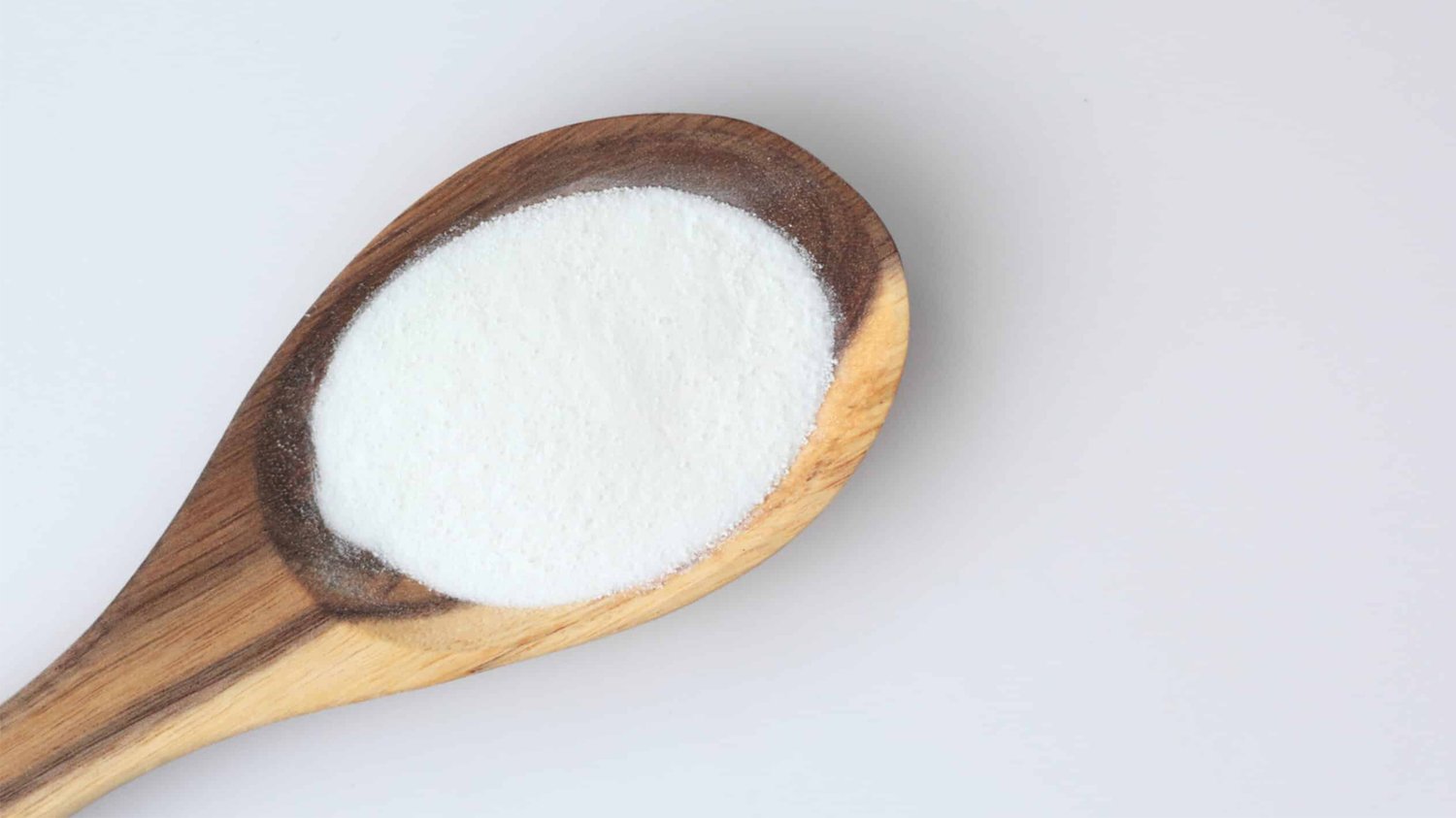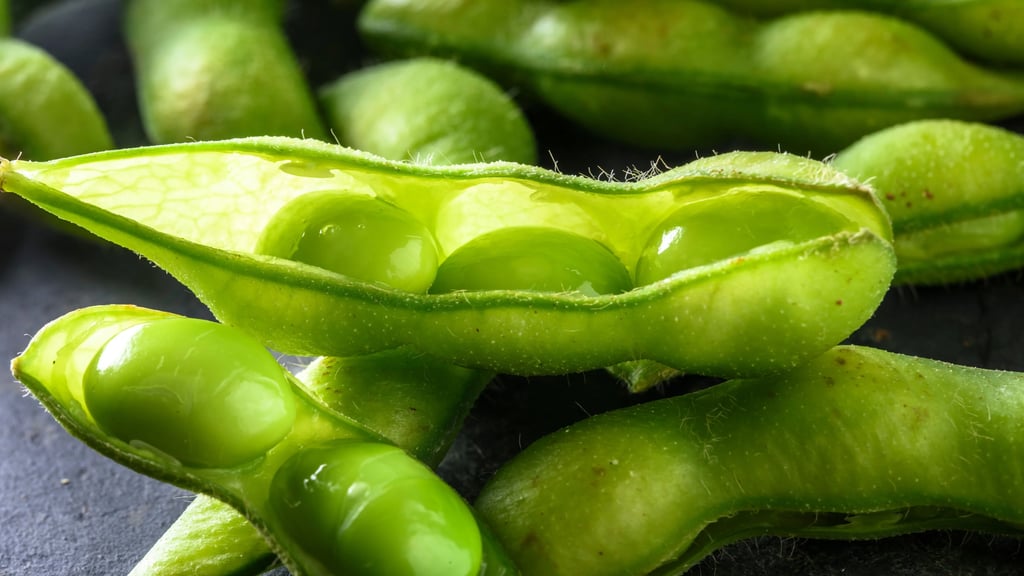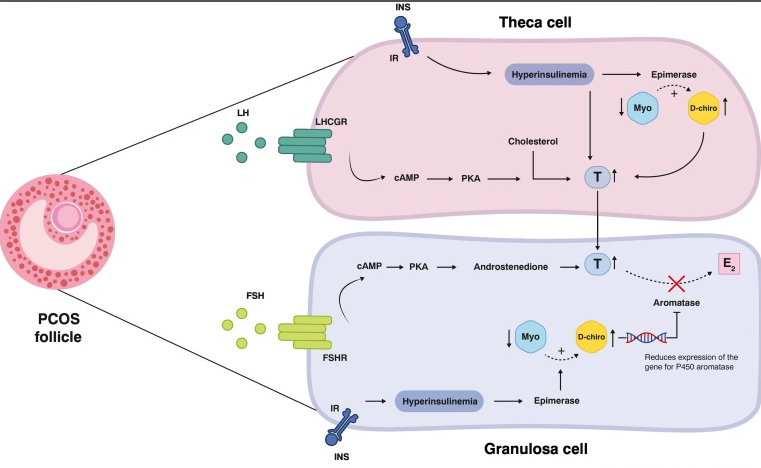In recent years, myo-inositol and D chiro inositol powder has become popular in the health community as a treatment option for women with polycystic ovary syndrome, commonly known as PCOS. Chemically, inositol can be regarded as a polyhydroxy derivative of cyclohexane, and its molecular formula is C6H12O6. It is widely distributed in animals and plants, and its content is highest in fruits, beans, corn and nuts. It is a growth factor for animals and microorganisms. Inositol has 9 cis and trans isomers, the most common of which is myo-inositol (MI), followed by D-chiro-inositol (DCI).
Inositol was once considered a sugar, but later analysis showed that it did not belong to the carbohydrate group. Inositol is now defined as a vitamin B complex, but there is still controversy because inositol is not an essential nutrient for the human body. The human body can synthesize it using glucose, and it can even be synthesized in prokaryotic cells.
D-chiro-inositol and myo-inositol have garnered significant attention due to their distinct health benefits. These two forms have unique properties and functions that make them valuable in different contexts, especially in areas like reproductive health, insulin sensitivity, and metabolic balance. How should we choose myo-inositol or D chiro inositol as our daily supplements? First learn its different is very important.
What is Myo-inositol
Myo-inositol is the most abundant form of inositol in the body and is considered a pseudovitamin. It is a six-carbon polyol (sugar alcohol) that plays a critical role in cellular signaling, particularly in the transmission of signals within cells. Myo-inositol is naturally found in various foods, including fruits, beans, grains, and nuts.
Myo-inositol Benefits
Reproductive Health
Polycystic Ovary Syndrome (PCOS): Myo-inositol is widely recognized for its ability to improve ovarian function in women with PCOS. It helps in regulating menstrual cycles, improving ovulation, and reducing the symptoms of PCOS.
Fertility: Myo-inositol supports fertility by enhancing the quality of eggs, improving sperm motility, and balancing hormone levels, which can increase the chances of conception.
Metabolic Health
Insulin Sensitivity: Myo-inositol plays a crucial role in improving insulin sensitivity, making it beneficial for individuals with insulin resistance or type 2 diabetes. It helps in lowering blood sugar levels and reducing the risk of metabolic syndrome.
Weight Management: By improving insulin sensitivity and metabolic function, Myo-inositol can assist in weight management and reduce the risk of obesity-related complications.
Mental Health
Anxiety and Depression: Inositol has been found to have a positive effect on mental health, particularly in reducing symptoms of anxiety and depression. It is believed to influence the serotonin receptors in the brain, which can enhance mood and overall mental well-being.
Panic Disorder: Some studies suggest that Myo-inositol can help in managing panic disorders, providing a natural alternative to traditional medications.
Skin Health
Acne Reduction: Myo-inositol may help in reducing acne, especially in individuals with PCOS. By balancing hormone levels, it can lead to clearer skin and reduce the occurrence of acne breakouts.
Lipid Metabolism
Cholesterol Levels: Myo-inositol can positively impact lipid metabolism, helping to lower LDL (bad) cholesterol levels and increase HDL (good) cholesterol, contributing to better cardiovascular health.
Cognitive Function
Neurotransmitter Regulation: Myo-inositol is involved in the regulation of neurotransmitters, which play a role in cognitive functions like memory and learning. It may help in maintaining cognitive health, particularly as people age.
What is D-chiro-inositol
D Chiro Inositol powder is short for DCI. It is a naturally occurring isomer of myo-inositol, which belongs to the B vitamin family. DCI plays a crucial role in various cellular processes, particularly in insulin signaling and glucose metabolism.
What Foods Contain D-chiro-inositol
Here's a table showing foods that contain D-chiro-inositol and their approximate content levels:
|
Food Source |
Approximate D-Chiro-Inositol Content |
|
Buckwheat (100g) |
1.5 – 2.0 mg |
|
Soybeans (100g) |
0.4 – 1.2 mg |
|
Carob (100g) |
0.5 – 1.0 mg |
|
Chickpeas (100g) |
0.2 – 0.5 mg |
|
Brown Rice (100g) |
0.1 – 0.3 mg |
|
Whole Grain Wheat (100g) |
0.1 – 0.3 mg |
|
Fruits (oranges, cantaloupe, etc.) |
0.1 – 0.2 mg |
|
Vegetables (peppers, tomatoes) |
0.05 – 0.1 mg |
D-chiro-inositol Benefits
Improved Insulin Sensitivity
Type 2 Diabetes: D-chiro-inositol is known to improve insulin sensitivity, making it beneficial for people with type 2 diabetes. It helps in reducing blood sugar levels by enhancing the body's response to insulin, which can lead to better glucose control.
Polycystic Ovary Syndrome (PCOS): Women with PCOS often have insulin resistance. D-chiro-inositol helps in improving insulin sensitivity in these women, which can reduce symptoms such as irregular menstrual cycles, excess hair growth, and acne.
Support for Reproductive Health
Ovulation and Fertility: D-chiro-inositol has been shown to support ovulation in women with PCOS, which can improve fertility. By helping regulate menstrual cycles, it increases the chances of conception.
Hormonal Balance: This compound helps in balancing hormones, particularly androgens, which are often elevated in women with PCOS. By reducing androgen levels, D-chiro-inositol can help alleviate symptoms like acne and hirsutism (excessive hair growth).
Cardiovascular Health
Cholesterol Levels: D-chiro-inositol may help lower LDL (bad) cholesterol and triglycerides while increasing HDL (good) cholesterol, contributing to better cardiovascular health and reducing the risk of heart disease.
Blood Pressure Regulation: By improving insulin sensitivity, D-chiro-inositol can also have a positive impact on blood pressure, helping to maintain it within a healthy range.
Weight Management
Reduction in Body Fat: D-chiro-inositol helps in regulating insulin and glucose levels, which can contribute to the reduction of body fat, particularly in people with insulin resistance or PCOS.
Appetite Control: Some studies suggest that D-chiro-inositol may help control appetite by influencing hormones that regulate hunger, making it easier to manage weight.
Mental Health
Mood Improvement: It may have positive effects on mood and mental health, particularly in individuals with PCOS, who are at a higher risk of depression and anxiety. By improving insulin sensitivity and hormonal balance, it may contribute to better emotional well-being.
Anti-Inflammatory Effects
Reduction of Inflammation: D-chiro-inositol has been shown to have anti-inflammatory properties, which can be beneficial in reducing inflammation in the body. This can be particularly helpful in managing chronic conditions associated with inflammation, such as metabolic syndrome.
Skin Health
Reduction in Acne: By balancing hormones, particularly in women with PCOS, D-chiro-inositol can help reduce acne, leading to clearer skin.
Support for Pregnancy
Gestational Diabetes: D-chiro-inositol may help in managing gestational diabetes by improving insulin sensitivity, thereby reducing the risk of complications during pregnancy.
Key Differences between D-chiro-inositol and Myo-inositol
While both Myo-inositol and D-chiro-inositol belong to the inositol family and share some similarities, they differ significantly in their chemical structure, biological roles, and health benefits.
Structural Differences
While both Myo-inositol and D-chiro-inositol belong to the inositol family and share some similarities, they differ significantly in their chemical structure, biological roles, and health benefits.

This difference in structure leads to their distinct roles in the body.
Myo-inositol and D-chiro-inositol Main Difference in Functions
Metabolic Pathways
Myo-inositol: It is the most common form of inositol in the body and plays a key role in cell signaling, lipid metabolism, and insulin sensitivity. Myo-inositol is a major precursor that can be converted to D-chiro-inositol and participate in glucose metabolism through a series of enzymatic reactions.
D-chiro-inositol: D chiro inositol powder is primarily involved in insulin signaling and is a key regulator of insulin-mediated glucose metabolism. It helps improve insulin sensitivity and plays an important role in regulating blood sugar levels in the body.
Insulin Sensitivity
Myo-inositol: Myo-inositol helps regulate blood sugar levels by improving insulin sensitivity by improving the function of insulin receptors. This is important in managing insulin resistance and preventing or managing type 2 diabetes.
D-chiro-inositol: D-chiro-inositol acts directly on the insulin signaling pathway, enhancing the effects of insulin, particularly in terms of glucose utilization and storage. Therefore, D-chiro-inositol is more focused on regulating insulin signaling, thereby helping to manage blood sugar and insulin resistance.
Reproductive Health
Myo-inositol: Myo-inositol is widely used to improve ovarian function in women with polycystic ovary syndrome (PCOS), helping to restore normal menstrual cycles and ovulation, and improving fertility. In addition, Myo-inositol is also very effective in balancing hormone levels in the body.
D-chiro-inositol: D-chiro-inositol is also effective in PCOS treatment, especially in reducing androgen levels in the body. It helps reduce symptoms such as hirsutism and acne, and can improve insulin resistance.
Distribution and Function
Myo-inositol: It is widely found in various tissues of the body, especially in the brain, kidneys and liver. It plays an important role in nerve conduction, cell signaling, and osmotic pressure regulation.
D-chiro-inositol: Although present in low concentrations in the body, it is important in regulating insulin signaling and glucose metabolism. D-chiro-inositol is abundant in adipose tissue and liver.
Studies have found that our bodies rely on myo-inositol and d chiro inositol powder working together as a team to mediate insulin action. Therefore, most health professionals now recommend a blend of myo- and d-chiro inositol at a ratio of 40:1 for the treatment of PCOS.
Conclusion
Myo-inositol and D chiro inositol powder are both important components of a healthy diet, with each offering unique benefits. Learn more about the differences between these two forms of inositol can help individuals make informed decisions about their use in health and wellness. XI AN CHEN LANG BIO TECH supply best price D chiro inositol raw powder, we are D chiro inositol manufacturer and supplier in global market. Please contact us: email: [email protected] if you want to buy D chiro inositol.



